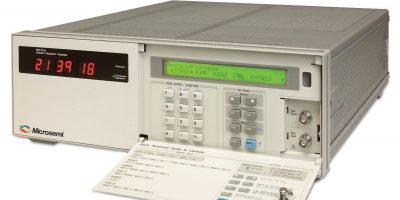Microsemi develops Cesium atomic clock for new ITU standards
Microsemi has completed certification of its portfolio of cesium clocks to be compliant with the new G.811.1 recommendation (known as enhanced Primary Reference Clocks, or ePRC) from the International Telecommunication Union (ITU). The G.8111.1 standard is for timing characteristics of enhanced primary reference clocks and raises the bar for frequency accuracy by an order of magnitude from one x 10E-11 to one x10E-12.
All clocks in a network must be referenced to a primary reference source (PRS). Microsemi’s cesium frequency standards 5071A, TimeCesium 4400 and TimeCesium 4500 with ePRC compliance are claimed to provide the highest level of autonomous frequency accuracy for PRS deployment in telecomms networks as required by international standards. According to data from the International Bureau of Weights and Measures (BIPM), responsible for managing the co-ordinated universal time (UTC) with time keeping institutions worldwide, and internal research from Microsemi, more than 99 per cent of the Cesium clocks deployed for the world’s time keeping and national time standards are driven by Microsemi’s cesium products, reports the company.
Microsemi targets customers within the communications, power utilities, public safety, data centre and government network markets with a secure and resilient timing environment, reducing dependency on the global navigation satellite system (GNSS). These are based on Microsemi’s Cesium atomic clocks, which provide an autonomous frequency reference utilising enhanced timescale algorithms.
Cesium technology has become the primary reference clock for networks to achieve higher transport speeds and increased reliability as GNSS technology as a time reference has become a concern due to vulnerabilities to threats such as jamming and spoofing, says the company.
An example is Microsemi’s BlueSky GPS Firewall which can be connected to a Cesium clock to provide extended hold-over by continuing to deliver a synthesised GPS signal to downstream GPS receivers even in the case of complete loss of live GPS reception.
Cesium clock technology from Microsemi is used in GPS satellites, both in space and ground stations. The Microsemi 5071A family and its TimeCesium family, both with ePRC compliance support, are available now.




